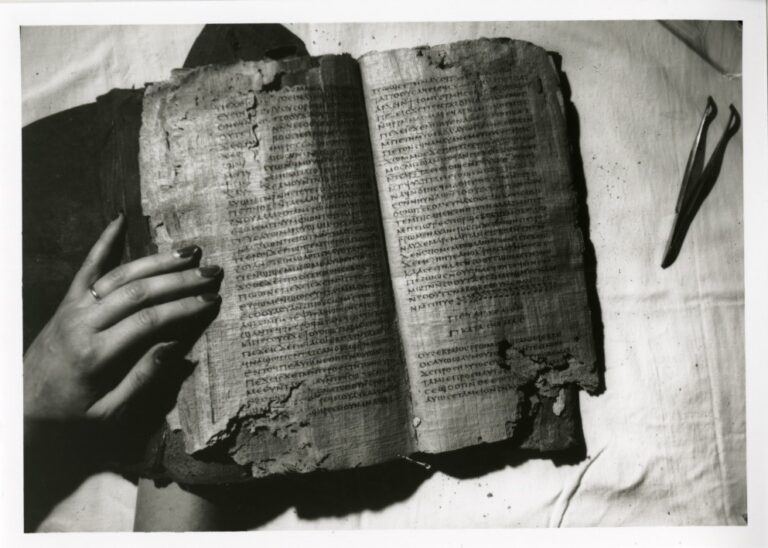
Home » Research » Current research projects » Research: Dr. Dylan Burns

Few topics in the study of ancient Mediterranean religion are as exciting and challenging as the study of Gnosticism, the school of thought associated with individuals who called themselves “knowers” (Greek gnōstikoi). My work on the ancient texts that contain Gnostic literature—above all, the thirteen Coptic manuscripts discovered near Nag Hammadi (Upper Egypt), in 1945—focuses on the relationship of this material to later Greek philosophy, apocalyptic literature, the borderlines between ancient Christianity and Judaism, and Graeco-Egyptian magic and alchemy. I am also engaged in research on the early modern reception of legends about the Gnostics; the emergence among philosophers and theologians of the notions of “gnosis” and, eventually, “Gnosticism”; and the reception of the first editions and translations of Coptic Gnostic works in the nineteenth and early twentieth centuries—prior to the Nag Hammadi discovery—a formative period in the academic study of Gnosticism where theosophists, occultists, and esotericists played important roles.

A particularly important issue for ancient philosophers was “providence” (Greek pronoia; Latin providentia): a concept dealing with the gods’ care; evil and dualism; and individual responsibility or free will. This book project addresses providence in late antique (fourth–sixth century) religious and philosophical literature, a period replete with fascinating and influential developments in notions of fate and divine care. With the rise of Constantine, providence became a tool of the new Christian, imperial propaganda, a turn that deeply impacted angelology and demonology. A new, dualistic religion—Manichaeism—sparked new debate and conceptions about the origins of evil, the meaning of the cosmos, and free will. The increasing predominance of theurgy in Neoplatonism was tied to increasing emphasis on the active care and foreknowledge of the gods, with important repercussions for new ideas about the mechanics of ritual, divine omniscience, and the significance of the gods’ care at the twilight of traditional Hellenic religion.
As part of the University of Amsterdam, our research falls under the umbrella of the Amsterdam School of Historical Studies (ASH) at the Faculty of Humanities.
As part of the Religious Studies unit the HHP centre participates in the interdisciplinary research group on Religious Dynamics and Cultural Diversity.
The presence in Amsterdam of the famous Bibliotheca Philosophica Hermetica, situated in the Embassy of the Free Mind, and of the rich material of the Amsterdam University Library’s Special Collections (Bijzondere Collecties) provides important research facilities for our staff. The HHP’s strong emphasis on historical research of primary sources is greatly advanced by these libraries and collections.
The HHP centre is an intrinsic part of a larger international network that promotes, creates and distributes peer-reviewed academic research in the interdisciplinary field of Western esotericism.
The European Society for the Study of Western Esotericism (ESSWE) was founded in Amsterdam in 2005, the staff at the HHP centre continues to be deeply involved with the further development of this international learned society.
Our staff has also been instrumental in setting up and running the leading peer-reviewed journal devoted to Western esotericism, Aries, and the Aries Book Series – both published by Brill under the auspices of the ESSWE.
An overview of dissertations completed at the HHP centre.
Would you to like to get in contact with our researchers or get more information about research at the HHP Centre?
The Center for History of Hermetic Philosophy and Related Currents (HHP) is part of the Faculty of Humanities at the University of Amsterdam. We are committed to the highest standards of critical academic scholarship, independent of any worldview.
Visiting adress:
Bushuis / Oost-Indisch Huis
Kloveniersburgwal 48
1012 CX Amsterdam
The Netherlands
Postal adress:
Postbus 1622
1000BP Amsterdam
Email: hermetica-fgw@uva.nl
The Center for History of Hermetic Philosophy and Related Currents (HHP) is part of the Faculty of Humanities at the University of Amsterdam. We are committed to the highest standards of critical academic scholarship, independent of any worldview.
Visiting adress:
Bushuis / Oost-Indisch Huis
Kloveniersburgwal 48
1012 CX Amsterdam
The Netherlands
Postal adress:
Postbus 1622
1000BP Amsterdam
Email: hermetica-fgw@uva.nl
The Centre for History of Hermetic Philosophy and Related Currents (HHP) is part of the Faculty of Humanities at the University of Amsterdam. We are committed to the highest standards of critical academic scholarship, independent of any worldview.
Visiting adress:
Bushuis / Oost-Indisch Huis
Kloveniersburgwal 48
1012 CX Amsterdam
The Netherlands
Postal adress:
Postbus 1622
1000BP Amsterdam
Email: hermetica-fgw@uva.nl
© HHP 2022 – by Digital Marketing Agency MIAX